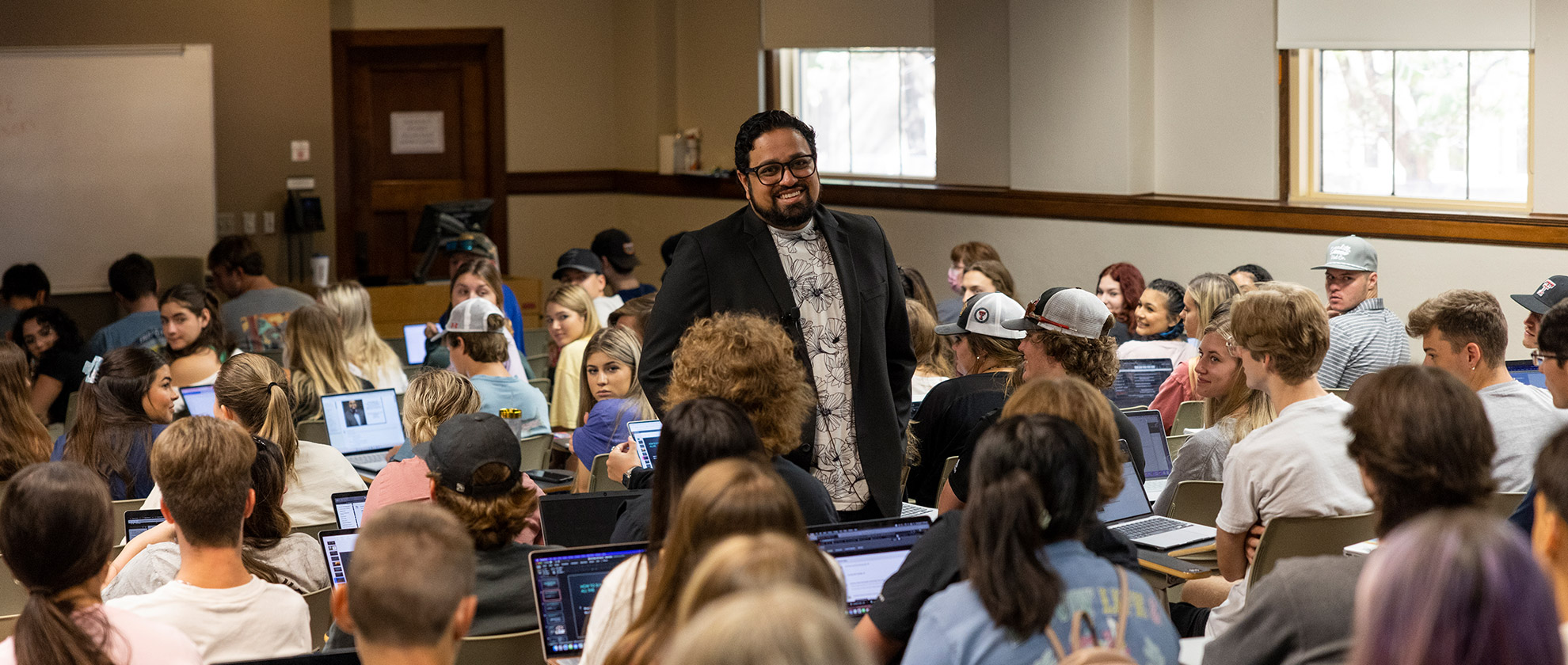Strategic Priority 3
Transform Lives & Communities through Outreach & Engaged Scholarship
- Establish outreach and engaged scholarship as essential university commitments by clearly promoting their definitions, value and measurable mutual benefit
- Develop a sustainable model for outreach and engaged scholarship programs
- Enhance recognition, incentives and professional development for faculty, staff and students engaged in outreach, engagement and community-engaged scholarship, aligning contributions with institutional priorities and career advancement
- Increase and strengthen collaborative, mutually beneficial community partnerships that stimulate creativity, innovation and social and economic development

Goal 1: Establish outreach and engaged scholarship as essential university commitments by clearly promoting their definitions, value and measurable mutual benefit.
We will...
- Develop targeted messaging that differentiates outreach (one-way educational/service activities) from engagement (mutually beneficial, reciprocal partnerships). Explicitly highlight measurable mutual benefits.
- Promote clearly defined Community-Engaged Learning (formerly “Service-Learning”) in alignment with institutional priorities, emphasizing reciprocal benefit, civic responsibility and student academic development.
- Incorporate engagement opportunities explicitly into research centers and institutes, clearly aligning outreach and engaged scholarship efforts with Texas Tech’s strategic research areas.
Key Performance Indicators
By 2030, we aspire to:
- Track and report engagement activities annually, including the number of opportunities, external partnerships, and faculty/staff/student awareness, all explicitly aligned with Texas Tech’s five strategic research areas and engagement priorities.
- Increase participation in engagement activities, with a focus on faculty, staff, students and research centers connected to strategic research themes.
- Expand and monitor community-engaged learning, including the number of designated courses, faculty teaching them and student enrollment in these courses.
- Assess the quality and impact of engagement, by developing a reciprocity metric (e.g., annual stakeholder surveys) and by reporting the percentage of undergraduates completing engagement-focused capstone projects, internships, fieldwork or undergraduate research.
Highlighted Initiatives
Community Engaged Learning
Community-Engaged Learning (CeL) is a university-wide program designed to integrate high-impact practices into coursework across all colleges, departments and divisions at Texas Tech University. CeL integrates community engagement with academic learning to deepen students’ understanding of content, ethical principles and civic responsibility. This educational approach aligns academic knowledge with real community needs, emphasizing social impact through sustained, collaborative and reciprocal partnerships. Students work alongside community members to address long-term social challenges and support community-driven solutions, resulting in meaningful transformation for both students and communities.
Tech Leadership Institute
The Tech Leadership Institute (TLI) is an 8-week program designed to help new students (first-year and transfer) develop their personal and professional skills so they can be more successful both in and out of the classroom and have a positive impact on the Texas Tech community. Students admitted into the TLI program meet weekly for two hours during the semester they are admitted for (offered in fall and spring). Each week will cover a different topic of leadership that is taught through discussions and activities done in both small and large group settings.

Goal 2: Develop a sustainable model for outreach and engaged scholarship programs.
We will...
- Secure diverse funding streams by expanding internal funding models and actively pursuing external grants.
- Develop and implement specific sustainability action plans for major outreach and engaged scholarship initiatives, explicitly outlining continued community benefit, reciprocity, resource allocation, funding sources and measurable societal impacts beyond initial funding cycles.
- Incentivize external funding opportunities for both university staff and faculty by developing clear reward structures tied to successful grant acquisition.
- Create dedicated outreach and engagement positions in each college to support and expand campus-community partnerships, prioritizing partnerships that align with Texas Tech’s AAU aspirations and long-term strategic objectives.
- Expand corporate and workforce development partnerships by setting engagement goals with industry stakeholders explicitly aligned with Texas Tech’s strategic research priorities.
Key Performance Indicators
By 2030, we aspire to:
- Create an incentive framework linked directly to external funding, consistently tracked across colleges and programs.
- Release annual impact assessment reports clearly tracking sustained societal impacts beyond initial funding cycles.
- Grow industry partnerships and memoranda of understanding in identified high-growth sectors tracked against strategic engagement goals.
Highlighted Initiatives
Texas Tech Innovation Hub Faculty C-Startup
This competitive grant program supports faculty in developing or enhancing courses that foster innovation and entrepreneurship, with a focus on incorporating best practices such as the Business Model Canvas and Lean LaunchPad. Awardees serve as ambassadors for entrepreneurship throughout the academic year, and their bios, photos and courses are featured online.
Enhancing Weather Intelligence and Flood Management in the Texas Hill Country
The proposed integrated weather solution for Flash Flood Alley, a highly flood-prone region located in the Texas Hill County, aims to enhance flood forecasting and warning capabilities through a high-resolution monitoring and modeling network. By expanding the West Texas Mesonet with new weather stations, adding automated rain gauges, deploying multiple high-resolution radars, and developing Texas-focused probabilistic and real-time weather prediction systems, the initiative will address critical gaps in current systems to predict catastrophic flooding events. These enhancements will provide real-time, high-fidelity data and tailored products to improve forecast accuracy and timeliness, ultimately reducing the devastating impacts of flash floods, as seen in the catastrophic 2025 event. The $24M project funding through the State of Texas and SB5 leverages existing Texas Tech University infrastructure and expertise to deliver actionable data to state agencies, the National Weather Service, and other stakeholders, with a two-year implementation timeline.

Goal 3: Enhance recognition, incentives and professional development for faculty, staff and students engaged in outreach, engagement and community-engaged scholarship, aligning contributions with institutional priorities and career advancement.
We will...
- Clearly communicate institutional priorities related to outreach, engagement, community-engaged learning and engaged scholarship, providing discipline-specific guidance on how these activities directly support tenure, promotion and career advancement.
- Align incentives with AAU-defined metrics, prioritizing externally funded projects that integrate measurable community impact (societal impact per original definition) and research excellence.
- Expand and publicize existing faculty awards recognizing engaged scholarship and community-engaged learning, clearly aligning criteria with tenure and promotion guidelines.
- Implement recognition programs and incentives for outreach, engagement, community-engaged learning, and engaged scholarship, clearly defined according to original framework definitions (reciprocity, community benefit).
- Offer targeted professional development opportunities based on original definitions of outreach, engagement, community-engaged learning and engaged scholarship to enhance faculty, staff and student capacities.
Key Performance Indicators
By 2030, we aspire to measure our societal impact by:
- Increase faculty participation in professional development related to outreach, engagement, community-engaged learning and engaged scholarship.
- Ensure tenure and promotion practices value engagement, with a goal of expanding the percentage of academic departments that explicitly recognize outreach and engagement in their criteria.
- Recognize excellence in engagement and scholarship, by tracking and increasing the number of annual awards for community-engaged learning and engaged scholarship activities.
- Align incentive structures with institutional and AAU priorities, by defining clear incentives for engaged scholarship and monitoring the number and percentage of externally funded projects in this area.
Highlighted Initiatives
Engaged Scholars & Practitioner Network
The Engaged Scholars & Practitioner Network was established to bring together engaged scholars (faculty, professional staff and graduate students) to connect, collaborate and build a culture and community of engagement. The benefits of this network include collaboration and networking opportunities, participation in workgroups to facilitate partnerships for engaged scholarship and grant opportunities, development pathways to community partnership and monthly newsletters including communication, resources and workshops.
Discoveries to Impact
Discoveries to Impact brings together the best of the best in West Texas. From researchers and scholars to innovators and entrepreneurs, this partnership has fostered a unique experience on Texas Tech campus. Discoveries to Impact is made possible through the exciting partnership between the Center for Transformative Undergraduate Experiences (TrUE), the Innovation Hub at Research Park, the Center for Integration of STEM Education & Research (CISER), and Outreach & Engagement.

Goal 4: Increase and strengthen collaborative, mutually beneficial community partnerships that stimulate creativity, innovation and social and economic development.
We will...
- Identify and prioritize community needs aligned with faculty/staff expertise, high-impact teaching practices and strategic research areas, using data-driven methods.
- Promote grant-funded opportunities that strengthen existing and develop new reciprocal community partnerships.
- Provide professional development to community members partnering with Texas Tech to build their capacity for sustained engagement.
- Expand corporate, governmental and international collaborations, establishing clear benchmarks for partnership growth.
- Strengthen engagement through innovation and entrepreneurship programs, increasing faculty/student participation in translational research and community-based problem-solving.
- Create structured frameworks to track and assess partnership effectiveness, ensuring clarity around reciprocal benefit and societal impact.
Key Performance Indicators
By 2030, we aspire to:
- Establish a baseline and increase the number of grant-funded community partnerships.
- Monitor and expand the number of professional development opportunities offered annually to community partners.
- Develop and implement a framework to evaluate partnership effectiveness, with a focus on community reciprocity and societal impact.
- Measure and increase the number and growth rate of meaningful agreements with corporate, governmental and international partners.
- Document and encourage faculty and student participation in innovation and entrepreneurship activities involving community partnerships.
Highlighted Initiatives
Industry Advancement Technology Track
The Industry Advancement Technology Accelerator supports faculty, students, and entrepreneurs in launching startups or licensing opportunities based on AI, machine learning, or advanced manufacturing technologies. Selected ventures receive funding, mentorship and co-working space to help them grow into successful companies addressing today’s complex challenges.
The Center for Early Head Start
The Center for Early Head Start (CEHS) in Texas Tech University’s College of Human Sciences is a federally funded program serving about 100 Lubbock families with children ages 0–3. At no cost to qualifying families, CEHS offers year-round, full-day childcare, nutritious meals, health and developmental screenings, parent education and support, and a home visiting program for expectant mothers and young children.
The mission of CEHS is to promote school readiness by nurturing the physical, emotional, social, language, and cognitive development of infants and toddlers; strengthening families as primary educators of their children; and advocating for children and families through a program grounded in state-of-the-art research.
Strategic Plan
-
Address
Texas Tech University, 2500 Broadway, Lubbock, TX 79409 -
Phone
806-742-2011 -
Email
provost.communications@ttu.edu
